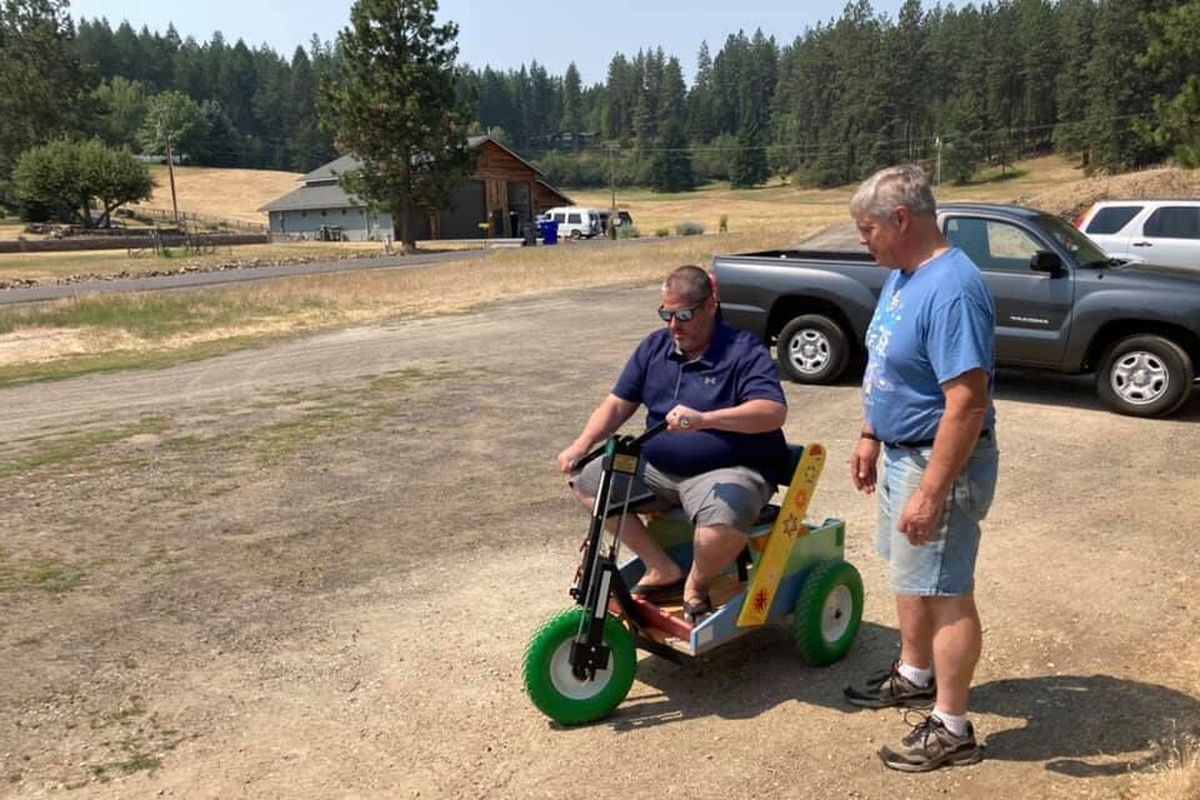Pandemic projects: Inland NW Trinity Project volunteer’s idea takes off: Wooden crosses carted worldwide

When Joe Kramarz read about Scott Hendricks’ wooden cross pandemic project in The Spokesman-Review, he wondered if there might be a way for Hendricks to partner with Inland Northwest Trinity Project.
Hendricks had begun making and giving away crosses last year after a grand mal seizure resulted in the discovery of a brain tumor and a diagnosis of astrocytoma – a slow-growing malignant cancer. The tumor caused epilepsy, leaving him unable to work or drive.
He began making the crosses in his backyard shed in Otis Orchards. Giving them away gave him a sense of purpose.
“I’ve given away over 500 hundred crosses in less than a year,” he said.
The crosses range in size from 6 to 24 inches – each different from the next. Some are coated with natural-finish stain, others are painted. All include a small red marble.
“It’s my trademark,” Hendricks said. “It stands for the blood of Christ.”
Kramarz, a longtime volunteer with the Inland Northwest Trinity Project, shared the article about Hendricks’ project with the nonprofit’s founder, Dick Carpenter, who encouraged him to explore the idea of using Hendricks’ crosses in the nonprofit’s projects.
Since 2005, the nonprofit (formerly Inland Northwest PET Project) has built and distributed hand-powered, three-wheeled personal mobility carts to 103 countries around the world.
The carts, called Rainbow Freedom Carts for their multiple colors, are sent to amputees and victims of war and disease who have no other means of mobility.
Built, painted and assembled in north Spokane, the lumber and steel vehicles feature sturdy parts and solid-core rubber wheels enabling transportation in terrain that would prove difficult for traditional wheelchairs to navigate. Each cart includes a payload area capable of hauling heavy loads.
Hendricks was happy to hear from Kramarz.
“The response to the story has given me some of the best interactions I’ve experienced,” he said.
He’s connected with parents who have lost children to brain cancer or seizures.
“A woman who’d lost her 19-year-old daughter came to choose a cross,” Hendricks said. “Her story stuck with me. She said she felt the spirit of her daughter in my workshop. That meant so much to me.”
In July, Hendricks and his wife, Tori, visited the shops where the Rainbow Freedom Carts are made.
“We got to ride the bikes (carts) and hear how life-changing they can be,” he said.
Kramarz said the Trinity Project faced some challenges during the pandemic. The nonprofit ships containers filled with 70 Freedom Carts to various stateside ports, and partners with several other ministries who distribute them in countries around the world.
“All four of those ministries failed during COVID,” he said. “All of the sudden we had no way to get the carts where they are needed.”
Enter World Vision. The global Christian humanitarian organization invited Carpenter to present the Inland Northwest Trinity’s mission before its board in Seattle.
“They accepted Dick’s proposal and said, ‘We’ll take everything you’ve got,’ ” Kramarz said. “We’ve already sent them a couple of containers, and they were delighted. God works in wonderful ways.”
The crosses Hendricks crafts will be placed in the tailgate section of the carts.
“I got so excited, I stopped and bought $400 worth of plywood on the way home,” Hendricks said. “I’ve already made 71 crosses for them, so far.”
He said he could not have imagined crosses crafted in his backyard would end up offering a message of hope to people all over the globe.
“I’ve been blessed by this in so many ways,” Hendricks said. “It’s exciting to be part of this project.”
———
Correspondent Cindy Hval can be reached at dchval@juno.com.